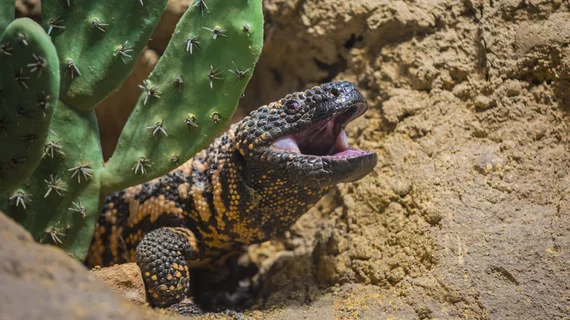Lizard saliva could be key to spotting elusive pancreatic tumors
Researchers have harnessed the power of lizard saliva to help them spot difficult to detect pancreatic tumors.
In fact, by binding the substance to a radiotracer, experts were able to improve the accuracy of identifying these tumors by as much as 30% compared to the standard of care.
Insulinomas are rare pancreatic tumors that produce an excess of insulin. The tumors are benign and do not spread, but they can cause issues with low blood sugar, prompting symptoms like dizziness, weakness and sometimes fainting.
Although insulinomas are easy to treat, detection can be difficult, authors of a new analysis in the Journal of Nuclear Medicine explain.
“People with this condition have little energy due to low blood sugar and often faint. It's a very challenging disease. It often takes a long time before patients get a diagnosis,” first author Marti Boss, with the Department of Medical Imaging at Radboud University Medical Center in The Netherlands, notes. “We can perform blood tests, but they can't confirm if a tumor is the cause or where it's located. Various scans like CT MRI, and PET are available, but don’t always show the insulinomas.”
The tumors can be surgically removed, but in order to do so, surgeons must know their precise location within the pancreas.
“In the past, surgeons would start cutting away portions of the pancreas until they found the tumor. If it was at the end, the entire pancreas would be gone,” adds Martin Gotthardt, professor of Nuclear Medicine at Radboud UMC.
The research team sought to determine how to more precisely detect these tumors on imaging. To do this, they focused their attention on GLP-1—a hormone secreted by cells in the pancreas that also helps to regulate blood sugar.
The saliva of Gila monsters—venomous lizards that are found in the southwestern U.S.—just so happens to contain a similar hormone (exendin-4) that binds specifically to GLP-1 receptors.
For the study, researchers adapted the substance to make it chemically stable enough to be in the human body; the chemically stable version is known as Exendin. The group then attached it to a radiotracer, creating68Ga-labeled exendin-4, to make it visible on PET imaging.
The team then had 69 adult patients with confirmed insulinomas undergo Exendin-PET scans in addition to routine imaging, including DOTA-SSA PET/CT (the standard of care), contrast-enhanced CT, contrast-enhanced diffusion-weighted MRI and endoscopic ultrasound. Exendin-PET imaging detected 95% of the tumors, compared to 65% with the standard of care. Even when the standard of care PET scans were combined with CT and MRI, the combo still missed 13% of the tumors that were visible via Exendin-PET.
While the study was small, the group is encouraged by the findings and believes that the new scan could one day become the standard of care.
“We believe the new scan can replace all other scans,” Boss says. “All the insulinomas we found with the new scan were removed, and all those patients were completely cured after surgery, even though some had been sick for decades.”
Learn more about the study here.


